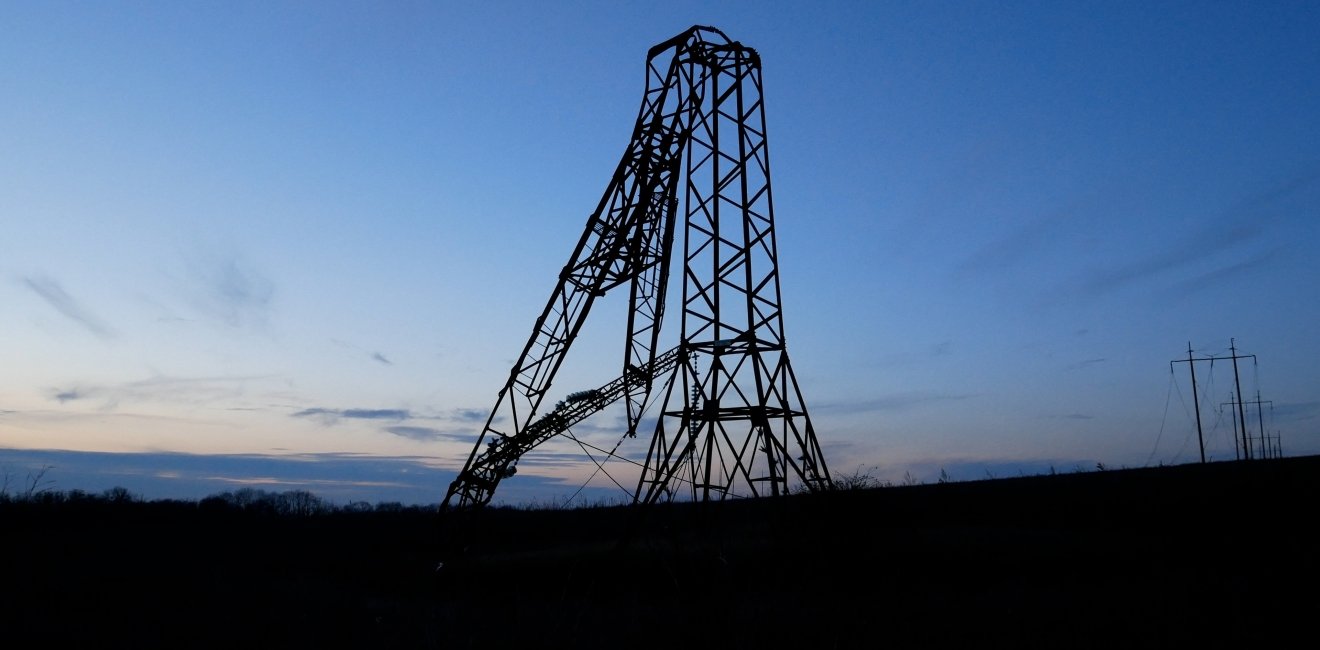
A blog of the Kennan Institute
After more than two months in which Ukrainians enjoyed an unrestricted electricity supply, on November 17 Russia launched a “massive attack” on Ukraine’s energy infrastructure. There is reason to believe that the Kremlin will continue to put pressure on Ukraine’s energy system this winter. But the West also faces severe consequences and should be gravely concerned about Russia’s energy terrorism.
The November 17 attack was the tenth large-scale attack on Ukraine’s energy system in 2024. The previous attack, on August 26, was the largest attack on Ukraine’s energy system in history. In between those two attacks, Russia carried out dozens of local strikes, primarily targeting power distribution facilities in front-line regions. The most recent wide-scale attack occurred on November 28.
As winter approaches, many are trying to guess what form Russia’s energy terrorism might take going forward, especially in view of a possible decrease in support from Ukraine’s allies next year. However, in this case, winter is not the only input into Russia’s strategic calculations. Russia plays a game that is long and broad, and increasingly transparently directed beyond Ukraine’s borders. How the West reacts—or fails to do so—is a major vector in the Kremlin’s planning.
Russia’s Motives in Conducting Energy Terror
Russian air strikes clearly aim beyond merely damaging Ukraine's power infrastructure and economy. These attacks are probably linked to foreign political changes and are intended to sow panic among Ukrainians and disillusionment with the course of the war—perhaps enough to cause Ukraine to sue for peace.
Social media bots, believed to have been coordinated by Russians, were already calling for Ukraine to capitulate back in 2022. Russia has further pumped up disinformation efforts by putting it out that Russian attacks did not cause rolling blackouts, Kyiv did, because—according to the disinformation narrative – the government wanted to export more electricity to Europe at higher prices, and therefore restricted the power supply to Ukrainian housholds.to bring in more revenue. These false claims are similarly intended to fuel citizens’ anger against the government and divide Ukraine.
In the larger geopolitical picture, however, when planning these attacks, Russia almost assuredly considers foreign affairs and political developments, both domestic and abroad. Russia needs to undermine the West’s trust in Ukraine and the West’s belief that Ukraine can go on resisting.
The change in the US administration will be the most significant foreign development that the Kremlin monitors in the coming months. Before Donald Trump’s inauguration on January 20, 2025, Russians may seek to attack Ukraine’s power system severely enough to create the impression that the country is destined for ruin. In September, during the presidential race, Donald Trump said Ukraine had already been demolished. Any major attacks resulting in significant power cutoffs in Ukraine over the next two to three months could strengthen the erroneous impression that Ukraine is buckling and lead to a drop in Western aid—an eventuality the Kremlin would welcome.
For these several reasons, Russia is likely to intensify its attacks on Ukraine’s power system. After a pause, it has collected enough missiles, and winter attacks are more psychologically harmful to the population than summer attacks. The Kremlin has opportunity to further degrade the situation in Ukraine, but the moment the new US administration comes to power will be telling. If the White House believes the situation in Ukraine to be hopeless, its actions in regard to Ukraine may favor Russia’s interests.
What If the West Fails to Act to Stop Russian Energy Aggression Against Ukraine?
A null reaction to Russia’s energy terrorism will not produce good results for the West either. Neglecting Russia’s energy terror can be expected to have immediate, direct results for the West and strengthen Russia strategically.
The greatest present hemispheric threat is a potential nuclear facility accident. Attacks on the transformer substations connecting Ukrainian nuclear power plants with the rest of the power system could lead to uncontrollable processes in the nuclear reactors. The International Atomic Energy Agency (IAEA) confirmed that Ukraine’s nuclear power plants, a key link in the power system, pose a growing concern over nuclear safety.
The Zaporizhzhia NPP is the most vulnerable, and the most worrisome. Europe’s largest NPP, it is located in Russian-controlled territory, and part of its grounds has been converted to a military base for Russian forces and for storage of explosives. The plant is connected to the Ukrainian grid and needs an uninterrupted power supply to maintain reactor cooling. Further attacks on or degradation of the plant would result in widespread blackouts.
Even European countries with good relations with the Kremlin will suffer from power outages in Ukraine caused by Russian air attacks. Hungary and Slovakia, for example, depend heavily on oil and gas transit from Russia through Ukraine and are not eager to see disruptions of Ukrainian energy infrastructure.
There should be no illusion that if Ukraine experiences blackouts, it will try to keep the oil and gas transit going instead of citing force majeure as a reason to halt such supplies.
How the Kremlin Views and Dares the West
If the West does not respond vigorously to stop the Kremlin’s energy terror, the Kremlin will perceive such restraint as a weakness and believe it is free to act similarly against other states in the future.
It’s likely the Kremlin already believes the West is weak. Russia still uses Western components to produce its missiles and drones, and Western components were detected in North Korean missiles used to attack Ukraine as well. So the Russian perception is that Ukraine’s allies may help repair the power system but are unable to clamp down sufficiently, through control of supply chains or third party-sales of components, to stop or reduce Russia’s ongoing energy attacks by cutting off supplies—perhaps the most efficient way to bring about a near-term reduction in attacks.
A lack of response from the West will, by default, cede Russia a free hand to attack the power systems of other states, especially those bordering Russia and Belarus. The West should not be surprised if some “unrecognized” drone attacks power stations in the European countries close to Russia and Belarus.
On a grim note, some European states may not view negatively waves of labor migration from Ukraine in the event of energy supply interruption. In the Czech Republic, for example, Ukrainian refugees contribute more money to the national economy than they receive in support. Germany, the EU country that has taken in the most Ukrainian refugees, encourages more to enter the labor force. Labor shortages in different countries mean that the arrival of Ukrainians from an energy-stricken country need not be viewed as a threat but as an opportunity.
By Constraining Russian Attacks, the West Bolsters Its Own Security
Force is the only language the Kremlin understands. Ukraine should be supported not only directly, with weapons and energy system supplies, but with effective restraint of Russia to prevent or reduce future attacks on the Ukrainian power systems. By taking that step and mounting something more than a null response, the West can take significant steps toward ensuring its own security and stability.
The opinions expressed in this article are those solely of the author and do not reflect the views of the Kennan Institute.
Author

Director, Energy Program, Ukrainian Institute for the Future

Kennan Institute
The Kennan Institute is the premier US center for advanced research on Eurasia and the oldest and largest regional program at the Woodrow Wilson International Center for Scholars. The Kennan Institute is committed to improving American understanding of Russia, Ukraine, Central Asia, the South Caucasus, and the surrounding region through research and exchange. Read more

Explore More in Focus Ukraine
Browse Focus Ukraine
Talking to the Dead to Heal the Living

Ukrainian Issue in Polish Elections


